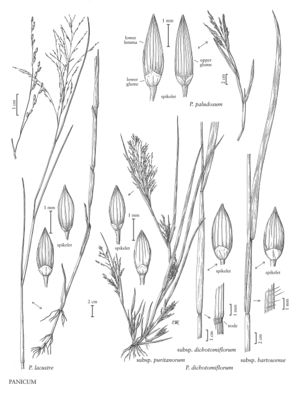Difference between revisions of "Panicum dichotomiflorum subsp. dichotomiflorum"
imported>Volume Importer |
imported>Volume Importer |
||
| Line 41: | Line 41: | ||
|publication year= | |publication year= | ||
|special status= | |special status= | ||
| − | |source xml=https://bitbucket.org/aafc-mbb/fna-data-curation/src/ | + | |source xml=https://bitbucket.org/aafc-mbb/fna-data-curation/src/200273ad09963decb8fc72550212de541d86569d/coarse_grained_fna_xml/V25/V25_1257.xml |
|subfamily=Poaceae subfam. Panicoideae | |subfamily=Poaceae subfam. Panicoideae | ||
|tribe=Poaceae tribe Paniceae | |tribe=Poaceae tribe Paniceae | ||
Latest revision as of 17:56, 11 May 2021
Culms 5-200 cm. Sheaths glabrous or sparsely pilose, not hispid with papillose-based hairs. Pedicels usually less than 3 mm and shorter than the spikelets. Spikelets 2.3-3.8 mm, tapered from below the middle to the acuminate apices; upper glumes and lower lemmas subcoriaceous.
Discussion
Panicum dichotomiflorum subsp. dichotomiflorum is the most common of the three subspecies and is found throughout the range of the species. In the past, members of this subspecies have been treated as two different taxa, var. geniculatum (Alph. Wood) Fernald and var. dichotomiflorum, with more erect, slender plants having fewer long-exserted panicles with slender, ascending branches and less crowded spikelets being placed in var. dichotomiflorum. Such plants are more common in the southern part of the subspecies' range, but the traits are poorly correlated and the differences are at least in part affected by photoperiod, nighttime temperatures, and the time of seed germination.
Selected References
None.
